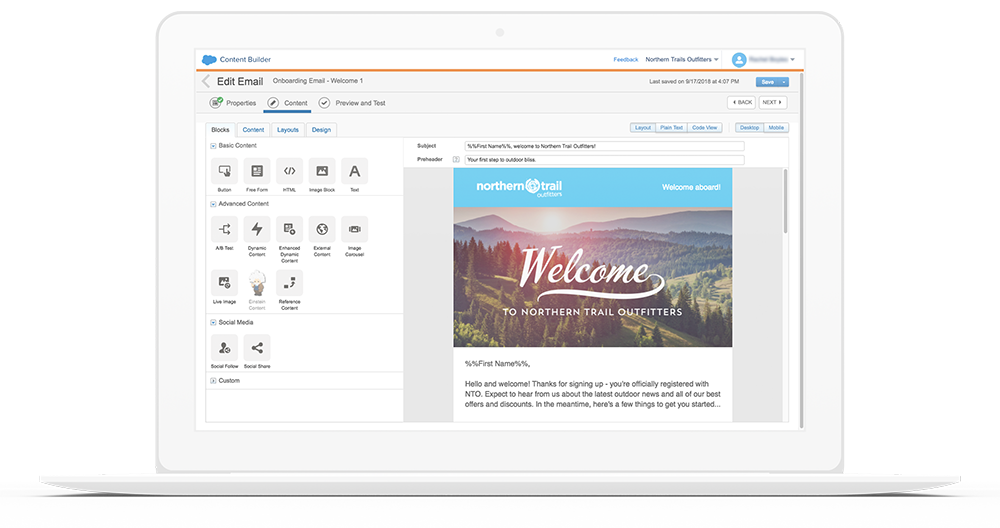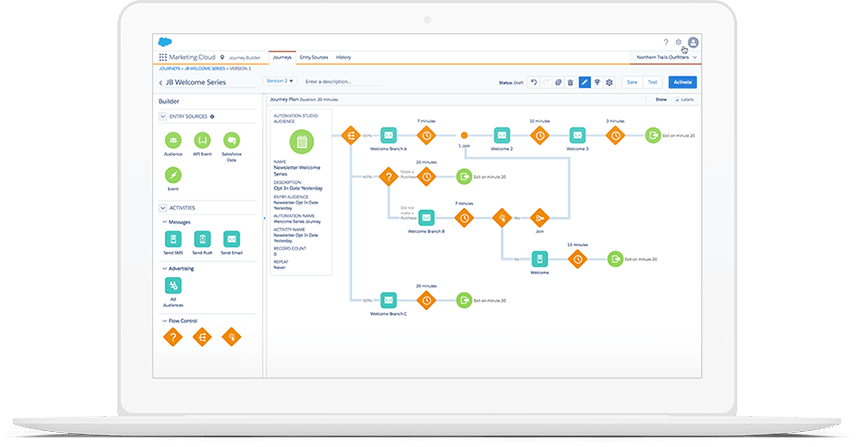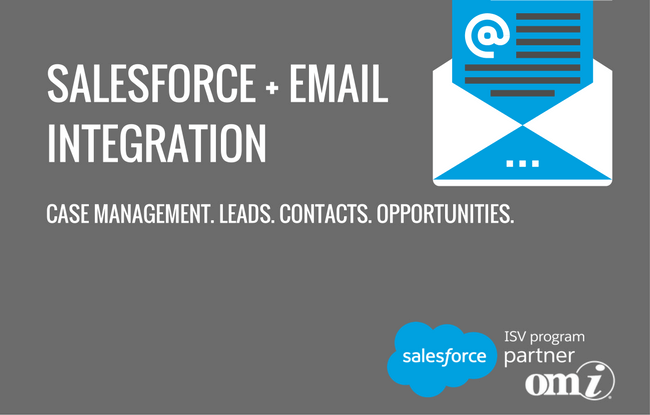No matter what kind of business you run, in which domain you operate or how large your operations are, any organization requires a solid structure. A company is fragmented into departments, which in turn have their own hierarchy, and every team member has his or her own pool of tasks. This structure allows you to organize a logical workflow and put the expertise of each employee in action. However, it cannot be achieved without stable and reliable exchange of information. And it doesn’t just apply to people and departments. Chances are good, you are using some sort of CRM software, but do your employees use email integration with it?
Marketing and sales departments, despite having finely defined roles, benefit and excel when working together. Same goes with email marketing and CRM platforms. Both of these things are great tools that your business may very well rely on, but putting them together creates an even stronger combination.
Today we will talk about multiple benefits and strategies of Salesforce email marketing integration. And as always we will touch on its technical application.
READ ALSO: Types of Salesforce Integration Solutions
Importance Of Email Marketing
Email marketing is often overlooked, deemed “too old-school” and “no more viable”, however this couldn’t be farther from the truth. According to Statista’s research, the email marketing ROI averages at $42 for every $1 spent, making it one of the most lucrative marketing activities.
Email marketing helps establish and maintain relationships with current and potential clients – regular communication builds credibility and trust. It’s also a very customizable kind of marketing; you can personalize emails to particular customer segments or individuals.
Its mobile-friendliness is also not to be underestimated. Through emails, users may engage with your brands with their smartphone as well. This matters a lot because Litmus says that email opens from mobile devices account for 46% of all opens.
All in all, email marketing in 2023 is still a very viable option. And it can even be enhanced with the help of Salesforce integration.
How Do Email Marketing And Salesforce Work Together?
Your email marketing efforts can be enhanced by Salesforce products in the following ways:

Source: Salesforce
Customer Behavior Tracking
Salesforce may be used to track customer behavior and activity history, which can be later used in customized email messages. For instance, Salesforce might start an email campaign with related goods or incentives if a consumer has previously bought a certain product.
Email Marketing Automation
Email workflows like welcome emails, abandoned cart emails, and follow-ups can all be automated using Salesforce. Businesses can save time and money while ensuring that their clients receive timely and relevant communications by removing much of the manual efforts invested in these operations.
Customer Info Syncing
Contact lists can be automatically synced between Salesforce and email marketing tools like Mailchimp, through integration. By doing this, businesses can make sure they are sending their emails to the correct people.
Analytics Capabilities
Salesforce can track campaign results, including open rates, click-through rates, and conversion rates. With the help of this data, your email marketing can be improved upon, optimizing the email copy or title, for instance.
Email Marketing Integration Strategies
First, let’s discuss some ways email marketing can be integrated with Salesforce. More than 80% of companies around the globe use email marketing, but not a large percentage integrate it with a CRM platform.
Integration can be a step to bringing your email campaigns to the next level. There are some undoubtedly effective tactics to consider when taking such steps.
Social Media + Email
Being one of the powerhouses in the digital marketing domain, SM (Social Media) is very often a go-to tool to boost the effectiveness of marketing strategies. The most simplistic approach would be incorporating “SM share” buttons. An easy trick of adding the opportunity to engage with the audience boosts a click-through rate by more than 150%.
Focusing on specific customer groups depending on their social media profiles is also a solid approach that leads to greater customer loyalty.
Salesforce Email And Marketing Analytics
A powerful CRM platform such as Salesforce provides a set of analytical tools that are used to manage marketing campaigns more effectively. However, not many SMB types of companies are utilizing such an approach. With small businesses, this is caused by relatively low amounts of data to work with and there is no need to pay for hyper-advanced software, simple tools such as 366 Degrees can do the trick. At the same time, mid-sized companies already have good amounts of data to work with, but only a 5th of them are using analytics.
Analytics is crucial to your business, since at medium business level already, there is no way to tell if the campaign is successful and are there any benefits of email marketing, without it.
Salesforce Automation For Email Campaigns
Automation is key to continuous and smooth workflow. Manual syncing and logging emails takes time, not much, but when you account for a human factor such as vacations, sick leave and simple “oops, forgot” it turns into a nightmare. And the larger the business is the more terrifying it can become.
Automated email integration solves all these issues and lets your employees focus on important matters at hand. Plus, across all the departments you will have up-to-date and complete email data.
These are just a few examples of how Salesforce email marketing can be implemented through integration.
Best Practices For Integrating Email Marketing And Salesforce
The following are some of the actions you should take to make the most out of your Salesforce integration with email marketing:
Automate Email Campaigns
One of the biggest assets you get from the integration is the automation capabilities, so make use of those. Use Salesforce to automate email campaigns, such as welcome emails, appointment reminders, or birthday greetings. This will help to save time and improve team efficiency.
Personalize Email Copies
Use data provided by Salesforce to personalize email content, such as including the client’s name, referencing recent interactions with them, or recommending personalized products or services.
Adopt A/B Testing
Test different email content, subject lines, and calls-to-action to optimize email campaigns for maximum effectiveness. Salesforce insights will help you analyze the results and make data-driven decisions to improve your upcoming email marketing efforts.
Segment Your Contact Database
Salesforce can assist you in breaking down your audience into segments based on their interests, preferences, and behavior. This will allow you to keep your database systemized and to set up targeted email campaigns that can resonate with each of your recipients.
Keep Your Data Updated
To make sure that customer info is up-to-date across both platforms, it’s essential to regularly clean and update data in both Salesforce and the email marketing platform you use (e.g. MailChimp).
READ ALSO: Third-party Salesforce Integration Best Practices
Benefits of Salesforce Email Marketing Integration
Now that we’ve covered the ways email marketing can be integrated, it is time to touch on the subject of “why”. There are clear benefits of email marketing on different levels of the organization.

Source: Salesforce
Advanced Reporting And Dashboards
Salesforce provides powerful visual dashboards where you can get a lot of insights into your email marketing performance. You can see various critical stats across multiple email campaigns such as open rates and click-through rates, and optimize your emails in accordance with this data.
Personalization And Customization
Salesforce allows for a lot of personalization options when it comes to your emails. Depending on the data you have about the prospect, their status, their stage in the sales funnel and their activity, you can customize email copies and titles for better marketing performance.
Remarketing Campaigns
Salesforce can help you reach out to customers who once were part of your sales funnel, but fell out of it for one reason or another. The system always retains the contact information and other vital data of leads that went cold, which will help you reconnect with them after some time with remarketing email campaigns.
Improved Sales Visibility
When email marketing is integrated with CRM, your sales reps will have real-time insights into customer behavior constantly. All the clickthrough data, potential prospects and other information that can be extracted from email campaigns equips your employees with better intelligence and therefore makes them stronger at their job.
Automated Follow-Up
Salesforce integration will enable you to schedule and auto send emails for better effect. You’ll be able to create sequences of emails and set up the program so that it sends follow-ups each three days, each week or any other stretch of time you deem reasonable.
Unified Contact List
This is something out of the realm of basic structure and organization. The reason why we put it on the list is that it is unbelievable how few companies utilize this approach in their business model. Synced contact list across the entire organization prevents redundancy, which can lead to mistakes, grants you better visibility into your customers and makes the entire process of tracking leads far more convenient.
Actionable Triggers
One of the best ways that Salesforce can improve your email marketing campaign is through setting up triggers based on the customer data stored in the CRM. Customer loyalty is built very often on minor individual elements, like a little birthday card in the email. Also, client retention is another key benefit of email marketing that cannot be overlooked. If for example, your clients’ subscription period is about to expire, then it is definitely time to execute a campaign. Automated Salesforce email marketing integration does all these little but important things for you.
Salesforce Email Marketing Pricing
Salesforce offers several email marketing packages (billed annually):
- Basic – $400/organization/month
- Pro – $1,250/organization/month
- Corporate – $3,750/organization/month
- Enterprise – custom pricing, contact sales team for details
All packages enable you to launch personalized email campaigns, and integrate the campaigns with Salesforce Sales Cloud. The Pro package expands on the Basic functionality, while Corporate allows you to use the Salesforce Journey Builder and the Salesforce AI assistant, Einstein.
The Enterprise package enables you to manage multiple businesses simultaneously with just one account.
Conclusion
There is definitely no way we can cover every single detail and aspect of email marketing integration in a single article. Besides, email is only a single part of your business infrastructure that can be integrated with a CRM with positive results. So we will briefly touch on the matter of technicality of Salesforce email integration.
The process of any data integration is not very long, but it needs to be executed flawlessly. The simpler some tasks are, the bigger the effect of a mistake, this one is no exception. The first step that your business needs to take is to identify all the points of integration and map it out. Then the most crucial part of the process will come into play – scheduling. When it comes to integration, what many people don’t understand is there has to be a clear plan and swift execution. Otherwise, your organization might face a major roadblock due to some data being unavailable. Only then can the integration of any type be performed.
If your business wants to implement Salesforce email integration then you can contact us at Outsource Management Inc. We are a world-class Salesforce service provider, specializing in advanced and highly scalable solutions for companies of any size and industry.
